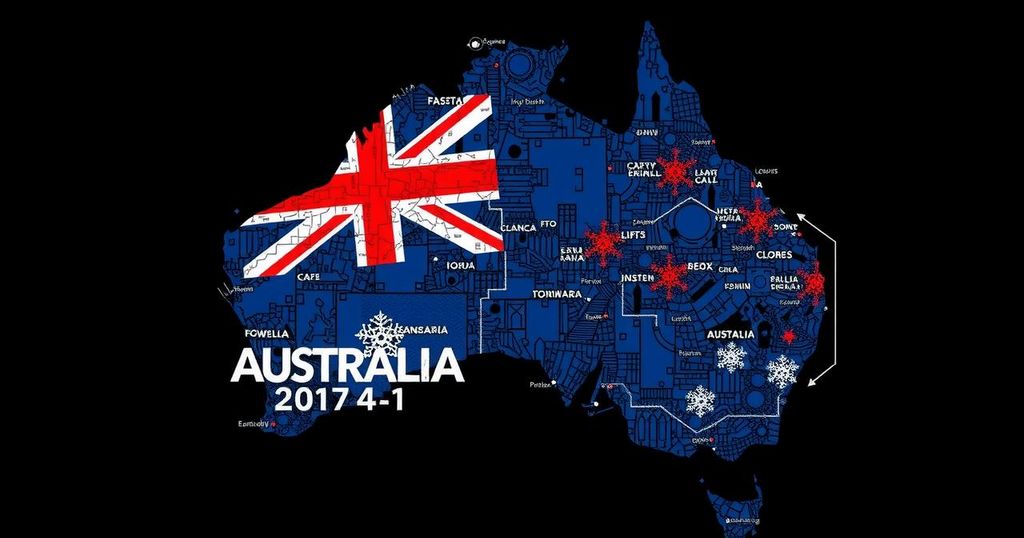The Impact of Deepfakes on Democracy: Lessons from the U.S. Elections for Australia
Deepfake technology has been deployed in the U.S. elections, creating serious implications for political discourse and electoral integrity. With reports of manipulated videos and misinformation targeting key political figures, Australia finds itself at potential risk as it approaches its own elections. The public’s difficulty in identifying deepfakes, combined with age-related vulnerabilities and the influence of social media algorithms, necessitates immediate awareness and educational initiatives to combat the spread of political disinformation.
As the United States grapples with the consequences of the recent re-election of former President Donald Trump, it is imperative to examine the role of artificial intelligence (AI) in disseminating disinformation, particularly through the use of deepfake technology during the electoral campaign. Numerous fabricated videos and images were circulated by Trump and his supporters, falsely attributing statements and actions to his opponent, Kamala Harris, raising significant concerns about the integrity of political discourse.
Deepfake technology, which creates manipulated videos that can appear convincingly real, poses a grave threat to democratic processes not only in the United States but also for other nations such as Australia. Microsoft has recently warned that Russian operatives are actively creating such videos that misrepresent Vice President Harris, contributing to a dangerous environment for political truth. Recent analyses illustrate alarming trends, suggesting a troubling gap in the ability of the public to discern these fakes from authentic media, with studies indicating accuracy rates as low as 50% for still images and only 24.5% for videos.
As Australia prepares for its upcoming elections, it is essential to recognize the potential ramifications of this technology. Noteworthy figures, including former Home Affairs Minister Clare O’Neil, have already raised alarms regarding the erosion of democratic integrity due to technological advancements. This sentiment is echoed in the actions of Senator David Pocock, who demonstrated the ease of creating deepfake videos of prominent political leaders. Instances of deepfake usage in Australia have emerged, illustrating its potential for manipulation; even local politicians have faced impersonation, highlighting the danger posed by this technology.
Moreover, the evolution of deepfake applications continues to raise red flags, as research suggests these manipulated formats breed mistrust in reliable news sources and create uncertainty in political narratives. The phenomenon of microtargeting exacerbates this issue, as tailored disinformation can prey upon specific vulnerabilities within demographics, ultimately skewing individuals’ political perspectives.
While younger Australians, often more engaged with social media, may possess a slight advantage in identifying such frauds, older citizens are particularly susceptible to misinformation, reinforcing the need for enhanced public education on recognizing deepfakes. As social media platforms perpetuate echo chambers, users may unwittingly share misleading content, particularly when it derides opposing political factions, thereby amplifying misinformation circulation.
Recognizing the limitations of AI detection tools means that fostering public awareness remains the most effective shield against deepfake misinformation. This technological challenge underscores a broader ideological concern: deepfakes signify a transformative threat to the foundation of free and fair electoral processes in democracies worldwide.
The article addresses the insidious role of disinformation and deepfakes in political landscapes, particularly focusing on the implications for future elections in Australia, drawing lessons from disinformation practices observed during the recent U.S. elections. It highlights the technological advancements in AI that enable the creation of realistic deepfake media, the difficulties in detecting such content, and the associated risks of misinformation undermining public trust in democratic institutions. It further explores the varying susceptibility of different age groups to these tactics and the need for vigilance and proactive measures to safeguard electoral integrity.
To conclude, the rise of deepfake technology represents not just a technical challenge but also a significant threat to the tenets of democratic processes. As seen in the U.S. electoral experience, the unchecked proliferation of disinformation can lead to distorted public perceptions and a deterioration of trust in institutions. Australia must address this issue with urgency, fostering a well-informed electorate capable of discerning fact from fiction to ensure the integrity of its own electoral landscape.
Original Source: theconversation.com




Post Comment